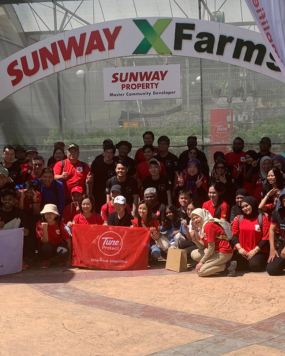Shoutout to all the Learning and Development (L&D) managers and teams who have been caring endlessly for your people. It’s no easy feat assessing everyone’s needs and designing relevant training programmes tailored to them; not to mention tracking and building your company’s working culture, so kudos to all your hard work! You undeniably play an important role in building skilled, knowledgeable and motivated workforces that can adapt to changing business needs and drive success.
Today we’re here to give you an idea or two as to why and how your company can consider incorporating sustainability-focused training; which is not only fun and interactive, but equips learners with the technical skills required to commit to sustainability goals together.
Introducing Sunway XFarms’ brand new ESG series training course that is fully HRDF claimable. In this blog post, we will be covering our top 2 training courses that are well-loved by our clients.
ESG Series 1: Sowing the Seed of Change – A Guide to Hydroponics Growing at Home

During this 4-hour workshop, participants will learn the principles and benefits of sustainable agriculture, explore sustainable farming practices that promote environmental stewardship and resource efficiency, the importance of social and community aspects in sustainable farming and gain hands-on practical tips and techniques for growing their own food sustainably at home.
Our favourite part of this workshop is the hands-on learning session– where each participant will get to unbox a mini farm kit and learn how to kickstart their hydroponics farming journey. Our learners love getting their hands wet, and the air is always filled with giggles and laughter as we get to see who has the better ‘green fingers’.
ESG Series 2: Building a Green Circular Economy on the Road to Zero Waste

During the 4-hour workshop, participants will learn about the benefits of adopting a zero-waste lifestyle by minimizing waste through sustainable actions such as recycling and composting. It highlights the environmental benefits of a zero-waste lifestyle and empowers participants with practical strategies for implementing these practices in daily life.
Composting is a relatively unfamiliar ground for many, even though most people have heard of the word. In urban areas where many live in high-rise apartments, the tendency to dismiss the idea of composting due to the lack of open space, pest issues or foul smell is high. But fret not, that’s where we come in to break down this seemingly complex activity into really simple steps that’s perfect for any type of home.
By now, L&D folks may be thinking that these topics sound amazing, but do they align with our corporate goals?
We’re here to answer YES!
Building a sustainability-driven culture: It’s important that sustainability is not just a buzz-word at the top management level, but understood and lived out at every level in your organisation, regardless of industry. What better way than to engage employees through practical and fun learning sessions? Seeing is believing, or in this context, harvesting is believing! The best way to preach sustainability is when we make it relevant and personal, lead by example, focus on benefits, and empower and educate.
Cross-Departmental Collaboration: Our training emphasises on both team building and collaboration, as well as personal creativity and innovation. Everyone gets their own farm (or compost) kit to bring home after the training, of which they are encouraged to continue to care for their project until it’s ready for harvest.
Environmental Impact: In the context of a green circular economy, learners can brainstorm on innovative ways to reduce waste at the office, which could result in a reduction of waste management and operating cost.
Incorporating sustainability-related workshops like urban farming and composting into corporate culture is slowly becoming the new standard. Not only does it benefit the environment and community, it also enhances employee engagement, fosters innovation and demonstrates a company’s commitment to Corporate Social Responsibility (CSR) and achieving key Environment, Social and Governance (ESG) goals, all of which are becoming increasingly important to a business’ future successes.
Interested in our workshops?



